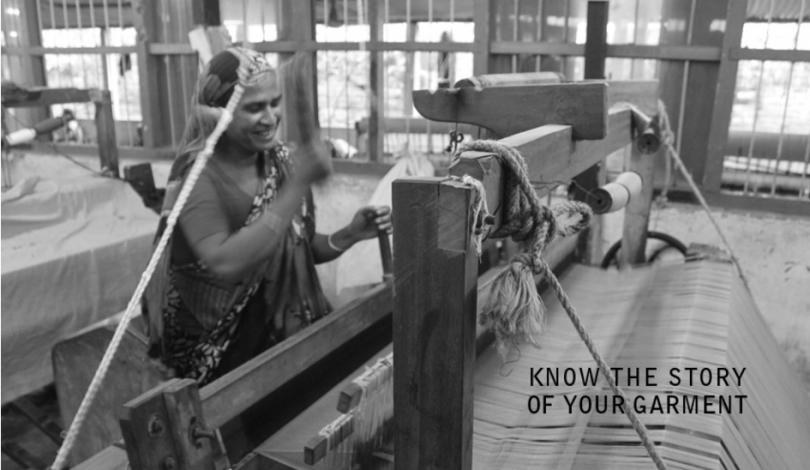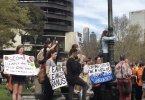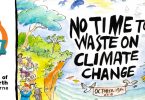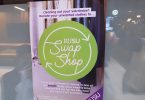When discussing waste and recycling in a domestic environment, food packaging and paper waste naturally spring to mind. Fashion is considered less an environmental issue because unlike food, the majority of people do not consider clothes as disposable. But mainstream fashion is fast, based on quickly responding to current trends. The industry encourages consumers to “keep up” with the latest styles by constantly updating their wardrobes. Fast fashion is accessible to the majority; low-quality goods can be created at high volume, resulting in more affordable products. These low-quality items may be more accessible, but in providing cheap fashion to strengthen sales, consumers unconsciously buy more. Unwanted clothing most commonly ends up in either landfill or at a second hand shop.
Recently, producers from ABC’s television show, War On Waste Australia dumped a 6000kg pile of clothing in Sydney’s Martin Place. This volume of fashion waste is produced every 10 minutes in Australia. Much of the clothing sold by fast fashion labels is made of blended materials, including plastics such as viscose and polyester, which can take up to 200 years to break down. Even if the clothing waste was made from natural fibres, landfill is not conducive to composting and even biodegradable fabrics do not fully break down in such conditions.
The opportunity shop is undoubtedly an invaluable ally to those who wish to lower the impact their fashion choices have on the environment. Op shops give clothing a second chance, both for those donating and those purchasing. Yet the rise in the consumption of low-quality goods has increased the amount of unsellable items donated to stores. Neville Barrett from Salvos Stores told the Sydney Morning Herald, “Generally speaking donations are slightly up on previous years, by perhaps one or two per cent. The quality of donations, however, has reduced a lot.” Much of what is donated to op shops cannot be sold on or dispatched overseas to those living in poverty because the products don’t wear or launder well.
The growth of fast fashion has meant many companies are sourcing the cheapest labour possible, treating workers unethically. The International Labour Organisation estimates that 170 million children are employed under child labour, that is “work for which the child is either too young – work done below the required minimum age – or work which, because of its detrimental nature or conditions, is altogether considered unacceptable for children and is prohibited” (as defined by the United Nations). Fashion is an industry wherein some tasks are suited to smaller hands. This makes fashion one of the worst industries for child labour because certain employers prefer hiring children, not only for the cheap labour but for their work ability. The fashion industry’s complex nature means stages of production are often separated, making it possible for textiles and garment factory operators to employ children without big companies or foreign consumers being aware.
Unethical labour involving sweatshops is of course not limited to children. The 2013 Savar building collapse in Bangladesh resulted in the deaths of 1,129 people and 2,500 people were left injured. The day prior to the infamous collapse, owners were warned to not use the building yet workers were ordered to return to work the following day, the day of the structural failure.
As fast fashion continues to speed up, there are those who actively seek alternatives. The slow fashion movement aims to be the anti-thesis of its counterpart. Sustainability is focused on economics, ecology and social equity. Using recycled materials for clothing manufacturing is beneficial on an environmental level and opens a new market for world profit, creating a new facet of the industry. Garments are produced in smaller quantities, by people who are paid fairly. Ethical fashion is a fast growing part of the industry, as consumers become more aware of the social and environmental effects of mainstream fashion.
These companies are looking for ways to operate their supply chains and production methods in an ethical manner.
- where Mountains Meet:
Launched in 2015, where Mountains Meet based in New York and produces fashion for women. Designers Genevieve Saylak and Corissa Santos uphold the mission to “bring conscious and conscientious design to life.” The name is an ode to their respect for nature from the William Blake quote, “Great things are done when Men & Mountains meet, This is not Done by Jostling in the Street.” Woven collections are all made I the famous New York Garment District. Where Mountains Meet also works with women in India, Guatemala, Peru and Bolivia aiming to have a positive influence that benefits the wider community. The women in these countries make knitwear and hand loomed textiles for the collections. By working directly with those making the textiles, the company cuts a leg of transportation from its production cycle, reducing their carbon footprint.
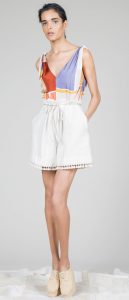
From the Summer/Spring 2017 collection for where Mountains Meet Source: http://www.wheremountainsmeet.com/
- Bhalo:
Bhalo is run from Australia and manufactured by Thanapara Swallows Development Society’s handicraft section, in Rajshahi, Bangladesh. The ethical clothing label differs greatly from much of the fashion consumers see out of Bangladesh. They aim to support and sustain those living is rural communities by providing local artisans and producers with work. Bhalo aims for transparency in their production to educate the consumer about the difference with ethical fashion. Thanapara is a member of the World Fair Trade Organisation and employs mostly women, providing them with training and jobs. Approximately 500,000 people move from rural communities to Dhaka every year, many of whom end up living in slums. By creating sustainable industry in remote areas, there is less reason for migration into overpopulated cities. Jess Priemus from Bhalo told The City Journal, “Fashion needs to be first and foremost desirable. We believe that being ‘ethical’ should not be some kind of special feature – it should be the minimum expectation of all labels.”
EMBED LINK HERE [https://youtu.be/2vrJxQ3_F2w]
- Thought:
Thought focus on producing high-quality, lasting garments for men and women, made form natural, organic and recycled fabrics. The London based company uses rayon, organic cotton, wool, hemp, bamboo and even recycled polyester plastic bottles, which when reworked is soft to create their garments. All items in a collection are made in the same country to avoid shipping and transport. Each season, unworn production samples are donated to Smart Works, the charity that provides women seeking work with interview training and dressing for interviews. Un-sold garments are sent to the UK charity In Kind Direct, who redistribute to those in need.
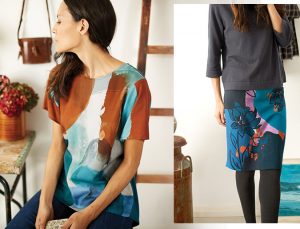
Photo by Tara. From Autumn/Winter 2017 Collection shoot.
Source: https://www.wearethought.com/blog/2017/08/02/autumn-winter-2017-behind-scenes/ - Noah:
Noah is looking to the future of streetwear. Founded by Supreme’s former creative director, Brendon Babenzien the brand “believe in doing things [their] own way, with conviction, according to principles [they] determine”, for Noah, this is the definition of punk rock. Portions of their profits are donated to causes the company believes in. They aim to put human dignity, and respect for cultures above the bottom line. In an interview with GQ Magazine, Babenzien said “a person’s real voting power in society comes not on Election Day, but in the things they buy. Buying 10 shirts made in a sweatshop in China is in some way showing your support for sweatshops in China. By creating collections that appeal to a younger demographic, Noah are engaging a new demographic to make responsible fashion choices, without giving up on the style they are accustomed to.
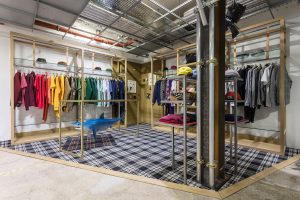
NOAH STORE NYC Source: https://noahny.com/pages/archive
- The Social Studio:
Melbourne based enterprise, The Social Studio is a not for profit organisation that includes a fashion label. The Social Studio is run for and by young Australians from migrant or refugee backgrounds and all income generated is put back into the community, students and staff. The Smith Street store is a fashion boutique and cafe serving East and West African inspired food. All clothing is designed and made in Collingwood using only recycled materials sources local. Even fabric cut offs are repurposed to make jewellery and accessories, whilst the textile printing is completed with zero ink wastage. Certified by Ethical Clothing Australia, The Social Studio prides itself on providing “opportunity for young members of the community who are most in need of a voice, mode of expression and agency.”
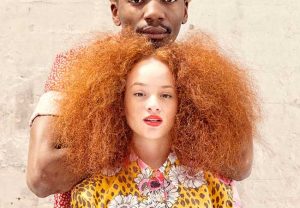
From The Social Studio fashion event.
Source: http://www.thesocialstudio.org/fashion-events-gallery/

